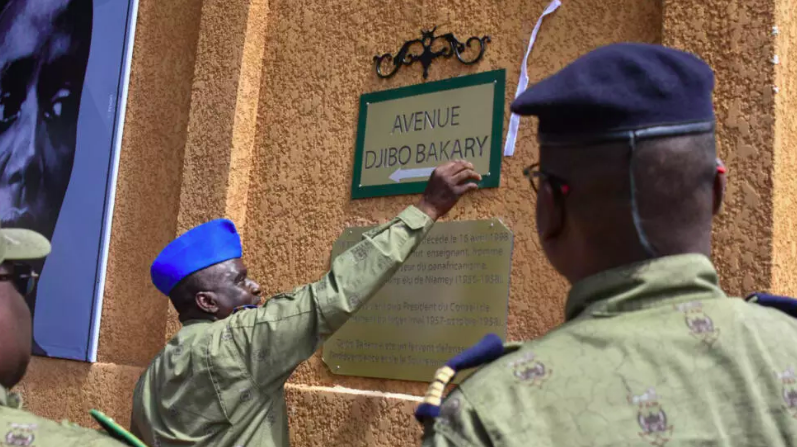Niger’s military government is changing anything connected to France as part of a complete severing of ties with its former colonial master.
For example in the capital Niamey, Avenue Charles de Gaulle on Tuesday was renamed Anenue Djibo Bakary as several government officials took to the streets to witness the new names’ inauguration.
“Most of our avenues, boulevards and streets… bear names that are simply reminders of the suffering and bullying our people endured during the ordeal of colonisation,” said Major Colonel Abdramane Amadou, Minister for Youth and a government spokesman.
Bakary a socialist politician who died in 1998 was a key figure in the struggle for Niger’s independence, which it obtained in 1960.
“The avenue which once bore the name of General Charles de Gaulle is henceforth christened ‘Avenue Djibo Bakary’,” Amadou added.
“It makes no sense for our streets to continue to bear the names of former colonists… and so justice is being done by renaming these streets, by naming them after our country’s heroes,” says Oumarou Abdourahamane, president of the Niger branch of the NGO Urgences Panafricanistes.
A portrait of French commander and explorer Parfait-Louis Monteil, engraved for decades in stone, was replaced by a plaque bearing the effigy of neighbouring Burkina Faso’s iconic communist leader Thomas Sankara.
An anti-imperialist hero nicknamed Africa’s Che Guevara, Sankara was killed in a 1987 coup his widow and supporters accuse France of having a hand in organising.
Amadou hailed Sankara as a man whose “struggle for liberation” and “emancipation of peoples” was “still inspiring people” today.
Meanwhile the Place de Francophonie was renamed after the Alliance of Sahel States – a confederation created with Mali and Burkina Faso in 2023, cementing relations between the coup-hit countries.
All three had their membership suspended to the 88-state International Organisation of La Francophonie in the wake of their coups.
From now on “we are going to honour our ancestors”, vowed General Assoumane Abdou Harouna, the capital region’s governor.
Since the coup, Niger’s authorities have expelled both the French soldiers fighting against the region’s persistent jihadist threat and the French ambassador, while the Franco-Nigerien cultural centre is no longer run as a joint venture and has been renamed after Niger’s filmmaker Moustapha Alassane.




















